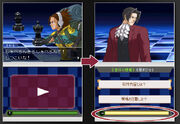| This article contains information from the unofficial English translation patch for Gyakuten Kenji 2. | |
|---|---|
|
Owing to the lack of an official translation of the Japan-only Gyakuten Kenji 2, the information and names in this article come from the unofficial English translation patch known as Ace Attorney Investigations: Miles Edgeworth: Prosecutor's Path. More information on this can be found here. If you have personal experience with the item of media in question, you can help the Ace Attorney Wiki by improving on this article. Please heed the manual of style when adding information. | |
| Miles Edgeworth |
| In order to get her to talk, I'll need to use the right strategy. Using the image of a chess game, I need to stay one step ahead of my opponent...! |
Logic Chess is a gameplay feature in Gyakuten Kenji 2 that is used by Miles Edgeworth to draw information out of uncooperative witnesses. In contrast to Phoenix Wright's magatama, which serves a roughly similar purpose, Logic Chess has Edgeworth rely purely on reading the opponent's behavior and reacting accordingly, rather than collecting evidence to figure out a secret. The name "Logic Chess" does not literally refer to the use of logic or chess, but instead describes the mental struggle between Edgeworth and his opponent, with Edgeworth using various strategies to move the conversation in his favor. Additionally, the name "Logic Chess" is never explicitly referred to within the in-game dialogue, and only appears at the beginning and end of each match. Consequently, it is purely an out-of-universe gameplay term. Defeating an opponent in Logic Chess completely restores the Truth Gauge.
Gameplay mechanics[]

In a game of Logic Chess with Nicole Swift.
Logic Chess always begins with Edgeworth assessing the situation and describing how his opponent behaves. Generally, this description involves figuring out how to find an opening to exploit. Edgeworth also envisions the opponent's secrets being defended by two to five black chess pieces, with each representing a separate phase in the match and holding a specific aspect of his opponent's secrets. The last piece is always a queen, representing the core secret that Edgeworth is trying to obtain. The goal in each phase is to capture a piece representing a secret, thereby revealing the information that it protects. Between phases, Edgeworth reassesses the situation to determine what to talk about next and how the next phase may play out.
In each phase, the player must choose from a selection of one to three topics with which to start the conversation. As the two characters talk, the opponent ends up making a statement to which the player can respond. The subsequent prompt provides the player with one or two direct responses, each represented by a white pawn, and the player must choose between pressing the attack with one of these responses, or waiting for another possible opening to present itself. At the bottom of the touchscreen is a timer that gradually depletes during these prompts, usually taking a minute to empty completely, forcing the player to assess the situation quickly. If the timer runs out, the player suffers a 5% penalty to the Truth Gauge and must start the phase all over again. Making the wrong decision at any given prompt results in a penalty to the timer, which varies depending upon the situation. For example, against a emotionally distraught Sebastian Debeste during the events of The Grand Turnabout, the option "You are a failure as a person!" results in full timer depletion. The timer is replenished at the end of each phase.
Each phase is further subdivided into initial topics. Clearing each topic leads to clues that are required to clear other topics. If a player lacks the clues needed to clear a topic, the conversation reverts to the choice of initial topics. If the player possesses a required clue, Edgeworth indicates that the clue should be used, and a prompt appears to choose between using the clue and waiting, with the clue being represented by a chess piece and the text describing the clue emphasized in orange. Using the clue is always the correct play.
Later in the game, the opponents become more sophisticated. The initial assessment becomes more vague and the situation may change drastically between phases. Nonetheless, it is still possible to figure out which behaviors indicate openings. There are also certain scenarios where the timer depletion rate is faster than usual, along with the tempo of the music. A notable example is the third phase of Blaise Debeste's Logic Chess, where he seems to be in a bigger hurry to leave.
Logic Chess opponents[]
| Episode | Character | Pieces | "Opening" Behavior |
|---|---|---|---|
| Turnabout Target | Nicole Swift | Pawn, Queen | Calms down |
| "Di-Jun Huang" | Knight, Queen | Lowers his intimidating tone | |
| The Imprisoned Turnabout | Jay Elbird | Knight, Queen | Tires out |
| Frank Sahwit | Pawn, Bishop, Queen | States an obvious lie | |
| The Inherited Turnabout | Larry Butz | 2 Pawns, Queen | Calms down |
| Dane Gustavia | Pawn, Bishop, Rook, Queen | Pretends to meditate and remains silent | |
| The Forgotten Turnabout | Lotta Hart | 2 Rooks, Queen | Calms down |
| Blaise Debeste | 2 Knights, Rook, Queen | Sweats; does not play with his lighter | |
| The Grand Turnabout | Justine Courtney | Bishop, Knight, Rook, Queen | Does not raise her gavel |
| Sebastian Debeste | Pawn, Knight, Bishop, Rook, Queen | Cries |

